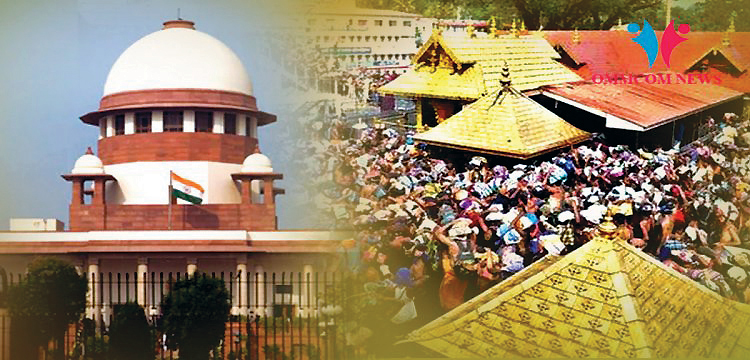

NEW DELHI: The Supreme Court on Thursday gave no stay on its earlier judgement lifting a ban on the entry of women aged between 10 and 50 years into the Sabarimala temple in Kerala and referred the review petitions on it to a seven-member bench for further consideration. A five-judge bench, in a 3:2 decision, clubbed the matter with entry of Muslim women to mosques and Parsi women to the tower of silence.
The five-member bench, headed by Chief Justice Ranjan Gogoi and comprising Justices Indu Malhotra, A M Khanwilkar, D Y Chandrachud and Rohinton Nariman, was hearing review petitions filed on the top court’s September 28, 2018 judgement which had lifted a ban on entry of women aged between 10 and 50 years to the Sabarimala temple. Justices Chandrachud and Nariman have written separate judgments.
The bench, in a 3:2 split verdict, referred the Sabarimala shrine review pleas to a larger seven-judge bench, without staying its earlier order.
The bench unanimously agreed to refer the religious issues to a larger bench. In September 2018, the apex court gave a verdict allowing women of all ages to enter the Sabarimala shrine in Kerala, in an issue linked to religious sentiments in the state.
The Chief Justice’s majority judgement observed it is time to evolve a judicial policy to do complete justice and for an authoritative enunciation of the Constitutional principles by a larger bench of not less than seven judges.
According to this verdict, women of all ages can visit the shrine till a larger bench decides this issue, which is actually no relief to petitioners who had moved the top court seeking a review of its previous judgement.
However, the majority verdict did not pass any decision against the apex court’s September 28, 2018, decision allowing women to enter the shrine nor did it stay the previous judgement.
The shrine is slated to open from November 17, but there is no clarity on the entry of women.
“That would ensure an authoritative pronouncement and also reflect the plurality of views of the judges converging into one opinion. That may also ensure consistency in approach for the posterity,” said the majority judgement.
It emphasised that a larger bench may put at rest recurring issues touching upon the rights flowing from Articles 25 and 26 of the Constitution (including public order, morality and health, freedom to manage religious affairs).
The majority bench observed the plurality of religions, languages, cultures and traditions, which is perceived as faith and essential practices of the religion for a particular deity by a section of the religious group, may not be so perceived (as an integral part of the religion) by another section of the same religious group for the same deity in a temple at another location.
Contextualising the contentions, the apex court said. “The individual right to worship in a temple cannot outweigh the rights of the section of the religious group to which one may belong, to manage its own affairs of religion.”
The Chief Justice’s majority judgement added, “It is our considered view that the issues arising in the pending cases regarding entry of Muslim women in Dargah/Mosque; Parsi women married to a non-Parsi in the Agyari; and including the practice of female genital mutilation in Dawoodi Bohra community may be overlapping and covered by the judgement under review.” — IANS
Oman Observer is now on the WhatsApp channel. Click here



